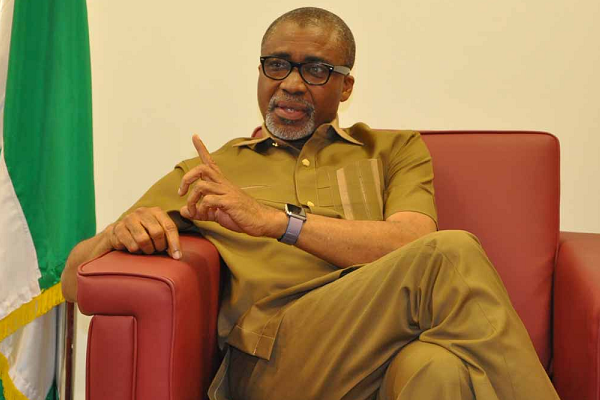By Emeka Alex Duru
In August 1999, barely three months into the current civilian dispensation, news went out on crisis between the then Abia State governor, Orji Uzor Kalu and his deputy, Enyinnaya Abaribe. Even without the facts of the face-off fully laid out, many likened the audacity by Abaribe as hunting in a lion’s den – a risky gamble of sort. And they had their reasons.
Kalu, was then the man of the moment. Tales were still fresh on his hefty donations to his Peoples Democratic Party (PDP) and its presidential candidate, Olusegun Obasanjo, during the campaigns. The same stories were replicated in Abia on how he ran his campaign from his pockets, in addition to funding the party in the state. At public functions, Kalu had spoken even on issues that many had avoided, often taking on Obasanjo that had then started manifesting the dictatorial tendencies that hallmarked his presidency. For his daring moves, Kalu was lionized in some quarters. Of course, at home, he had within the short period, appropriated the entire levers of Abia politics. He was a colossus of sort.
Thus, when Abaribe got entangled with Kalu on the consuming feud, it appeared a suicidal mission of sort. “Was this not the same Kalu that even Aso Rock dreaded that Enyi (as he is called by his admirers), was daring? Why would he not simply go and beg for forgiveness even if he was not at fault, keep his job and move on?’ concerned Abia indigenes and party members had asked. True to their fear, the battle did come and took its toll. Abaribe lost out. But not without a fight. Twice, between 1999 and 2000, the State’s House of Assembly made moves to impeach him without success. In 2003, while facing his third impeachment, he resigned on March 7, 2003, sending his resignation via DHL so as to have written record of it. The Assembly formally voted him out of office several days later, in a move Abaribe called “medicine after death”.
Abaribe decamped to the then All Nigerian Peoples Party (ANPP) to challenge Kalu in the 2003 Abia State Governorship election – but lost. That did not deter him. If anything, rather, he was emboldened to dare, capping it with election to the Senate in 2007, representing Abia South Senatorial District. He has remained in the upper lawmaking house, ever since, currently occupying the post of the Senate Minority Leader. That is the Abaribe phenomenon – a mystique, indeed.
Standing firm where others quiver, Abaribe fits into the description of ‘the noblest Roman of them all’, as Mark Anthony, one of the characters, described Brutus, in “Julius Caesar”, one of the great works of William Shakespeare. When he literally shook the tables at the Senate sitting on Wednesday, January 29, 2020, calling on President Muhammadu Buhari to resign, on account of the deteriorating security situation in the country, Abaribe was taking a unique course. Most of his fellow senators and even their colleagues in the House of Representatives, had apparently to avoid angering the President, turned their blames on the Service Chiefs, demanding their resignation for not living up to expectation. But for Abaribe, that merely amounted to punishing a messenger while indulging his principal – a kind of hiding behind a finger.
“Nigerians did not elect the IGP. We did not elect the Chief of Staff…We elected the government of APC in 2015 and re-elected them in 2019. The reason we re-elected them was that they continued to tell us that they had the key to security. When you want to deal with a matter, you go to the head. So, we will go to the government and ask this government to resign because they can no longer do anything”, he said in a contribution that virtually divided the chambers. The Presidency promptly reacted to the call, describing it as lacking in essence.
Whatever interpretation Buhari and his media handlers ascribe to the presentation may not really matter to the senator. What really concerns him is telling the truth to power and serving the country meritoriously. He is not the type that runs at pace with the elite where he rightly belongs, rather, often taking steps that approximate to class suicide. For instance, a couple of years ago, when agitations by the Indigenous Peoples of Biafra (IPOB) for a separate state of Biafra rankled Buhari greatly, some political and business leaders from the East who felt their interests could be threatened by the IPOB demands, publicly disowned the group or spoke tongue-in-cheek on the merit of their agenda. Abaribe stood out, spoke on the reasons behind the agitations, condemned the highhandedness of the federal government on the group and advocated dialogue and justice as the way out.
He went ahead, with other members of the South-East senate caucus, to meet Buhari when the IPOB leader, Nnamdi Kanu, was detained by the Department of State Security (DSS). Kanu was eventually granted bail with N100m surety for him and each of his two colleagues The Senators rallied round and perfected the bail conditions.
Abaribe later suffered for this on June 22, 2018, when he was arrested by DSS for being one of Kanu’s sureties. He was released the on 26 June 2018 on bail.
The IPOB saga was not the first time Abaribe would be sticking out his neck on issues concerning the South East. He had earlier been involved in securing bail for Ralph Uwazuruike, leader of the Movement for the Actualization of the Sovereign State of Biafra (MASSOB) in 2007. Abaribe and other members of the South East Senate Caucus had, then, gone to late President Yar’Adua and made a case for Uwazuruike and MASSOB, stressing that the group was simply crying out because of certain policies of the federal government which alienated the Igbo from the mainstream of the country. They advised that the best way to deal with such agitators was not to lock them up but to engage them in dialogue on their grouses. Their intervention ensured bail for Uwazuruike.
The Senator, has also championed other causes of public interest without attracting headlines. But by far, his principled call on the president to resign, seems the most audacious, so far. While the Presidency dismisses the call, admirers of the senator, say it is heroic. Istifanus James, a Lawyer, told our reporter that it is only those who may have had experiences on the unceasing insecurity in the country that can understand the essence of Abaribe’s call. “I am not from his (Abaribe)’s constituency. I am from Plateau State. But I give it to him that he made a lot of sense in his submission. It is only somebody who has lost a relation or property on account of insecurity in the country that will understand the pains he had while making the demand. Yes, the call may not automatically lead to the President throwing in the towel but it should make him and his team sit up”, he said.
Perhaps, Abaribe’s remark may have registered some points at the Presidency, despite the attempts by Buhari’s media aides to dismiss it. A day after the senator’s presentation, Buhari summoned the Service Chiefs for a crucial meeting. Many expect a new agenda at tackling the menace of insecurity in the land from the parley.
Enyinnaya Harcourt Abaribe, earned his WASSCE from Government College Umuahia in 1974. He went on to the University of Benin, where he received a Bachelor’s degree Economics in 1979 and a Master’s degree in Economics in 1982. He was born on March 1, 1955.













